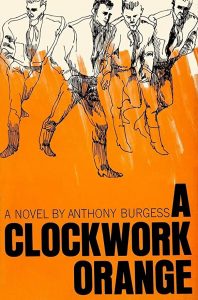Execution of the Soul:
A Clockwork Orange and Justice
By İbrahim Eren Adalı

Anthony Burgess’s A Clockwork Orange (1962), a poignant novel recognized as a remarkable figure of the dystopian genre, revolves around the issues of crime and discipline, and highlights the destructive results of unjust punishment. The novel explores extreme brutality and how Alex, a psychotic gang leader, is subjected to controversial physiological treatment organized by the health institution due to his past misdeeds. Although the institution aims to reintroduce Alex into society again, his mental state is harmed terribly because of the horrible rehabilitation. A Clockwork Orange exposes how the government’s treatment technique violates justice and the right to live and also how Alex turns into a programmable soulless entity due to the torturous experiment.
Anthony Burgess emphasizes the brutal experiment to grapple with the miscarriage of justice and Alex’s right to live. The inhuman experiment is almost like Pavlov’s classical conditioning. The aversion therapy successfully obliterates his inner tendencies and antisocial behaviors. They teach him to suppress his darkest impulses that make him the other, unnatural or even abject in the community. In other words, Alex has been conditioned and mechanized by the authorities. A vicious system that aims to make him less human and more mechanical turned him into an almost de-humanized soulless entity. His re-programmed involuntary behaviors are unfamiliar, strange, and even uncanny. Alex’s tragedy now is that he is no longer among the living since he is now nothing but a mere humanoid. The unjust punishment of the authority executes Alex’s humanness. The experiment is almost like a venom that attempts to capture his essence. One might even say that Alex, at a metaphorical level, is killed by the government, and the treatment is the allegory of this murder.
The novel offers a critique against extreme punishment and unusual experiment that killed Alex brutally. It is worth recalling the famous scene in which Alex is strapped into a wheelchair and forced to watch horrific images in the screening room during the treatment. This iconic scene is interesting to explore since the frightening cinema theater bears a striking resemblance to an execution chamber. Even though they try to hide behind moral values to justify their atrocities, the monstrous doctors around Alex are the equivalent of executioners. It is also critical to note that after Alex is released from prison, he strives to be part of his family again. However, it turns out that Alex has become nothing more than a stranger in his family’s eyes since his family has a new Alex in the house. One might argue that Joe, a new lodger in the household, can be considered the new child of the family who replaces their deceased son, Alex. That event sheds light on how Alex was executed relentlessly due to his heinous crimes in the novel. A Clockwork Orange invites us to explore the unfair punishment and violation of the right to life in the story. The novel also serves as a perfect critique of manipulative practices and a miscarriage of justice.

